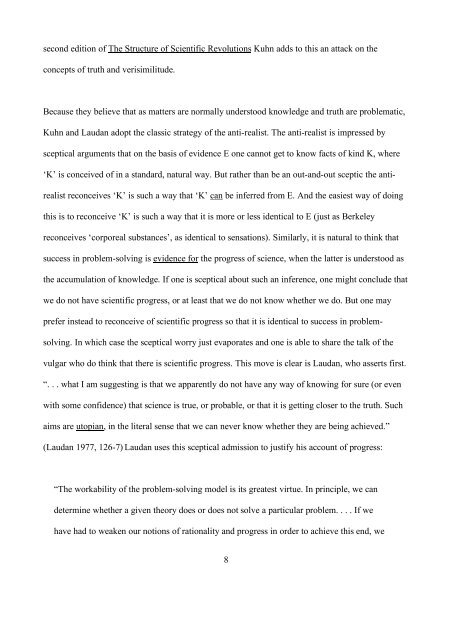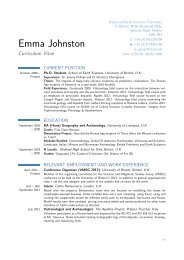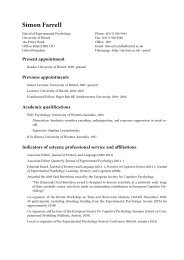What is Scientific Progress?
What is Scientific Progress?
What is Scientific Progress?
You also want an ePaper? Increase the reach of your titles
YUMPU automatically turns print PDFs into web optimized ePapers that Google loves.
second edition of The Structure of <strong>Scientific</strong> Revolutions Kuhn adds to th<strong>is</strong> an attack on the<br />
concepts of truth and ver<strong>is</strong>imilitude.<br />
Because they believe that as matters are normally understood knowledge and truth are problematic,<br />
Kuhn and Laudan adopt the classic strategy of the anti-real<strong>is</strong>t. The anti-real<strong>is</strong>t <strong>is</strong> impressed by<br />
sceptical arguments that on the bas<strong>is</strong> of evidence E one cannot get to know facts of kind K, where<br />
‘K’ <strong>is</strong> conceived of in a standard, natural way. But rather than be an out-and-out sceptic the anti-<br />
real<strong>is</strong>t reconceives ‘K’ <strong>is</strong> such a way that ‘K’ can be inferred from E. And the easiest way of doing<br />
th<strong>is</strong> <strong>is</strong> to reconceive ‘K’ <strong>is</strong> such a way that it <strong>is</strong> more or less identical to E (just as Berkeley<br />
reconceives ‘corporeal substances’, as identical to sensations). Similarly, it <strong>is</strong> natural to think that<br />
success in problem-solving <strong>is</strong> evidence for the progress of science, when the latter <strong>is</strong> understood as<br />
the accumulation of knowledge. If one <strong>is</strong> sceptical about such an inference, one might conclude that<br />
we do not have scientific progress, or at least that we do not know whether we do. But one may<br />
prefer instead to reconceive of scientific progress so that it <strong>is</strong> identical to success in problem-<br />
solving. In which case the sceptical worry just evaporates and one <strong>is</strong> able to share the talk of the<br />
vulgar who do think that there <strong>is</strong> scientific progress. Th<strong>is</strong> move <strong>is</strong> clear <strong>is</strong> Laudan, who asserts first.<br />
“. . . what I am suggesting <strong>is</strong> that we apparently do not have any way of knowing for sure (or even<br />
with some confidence) that science <strong>is</strong> true, or probable, or that it <strong>is</strong> getting closer to the truth. Such<br />
aims are utopian, in the literal sense that we can never know whether they are being achieved.”<br />
(Laudan 1977, 126-7) Laudan uses th<strong>is</strong> sceptical adm<strong>is</strong>sion to justify h<strong>is</strong> account of progress:<br />
“The workability of the problem-solving model <strong>is</strong> its greatest virtue. In principle, we can<br />
determine whether a given theory does or does not solve a particular problem. . . . If we<br />
have had to weaken our notions of rationality and progress in order to achieve th<strong>is</strong> end, we<br />
8






